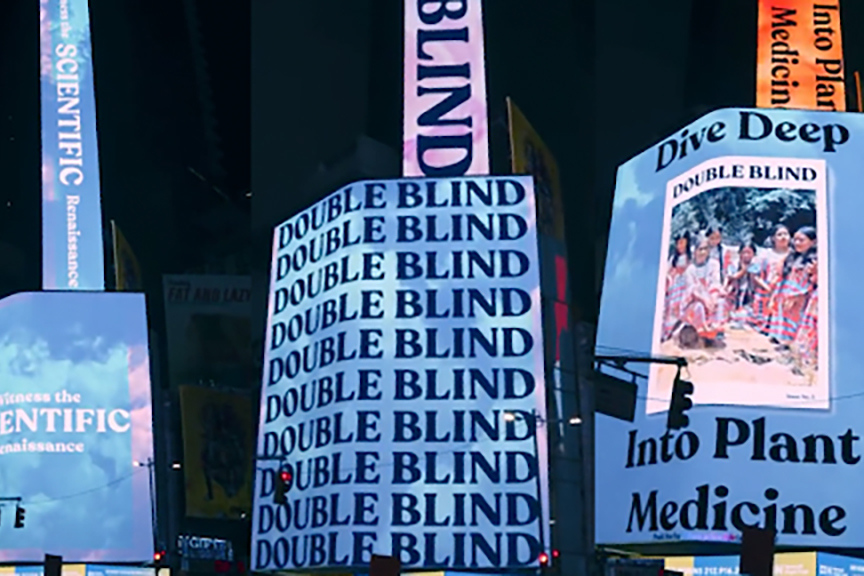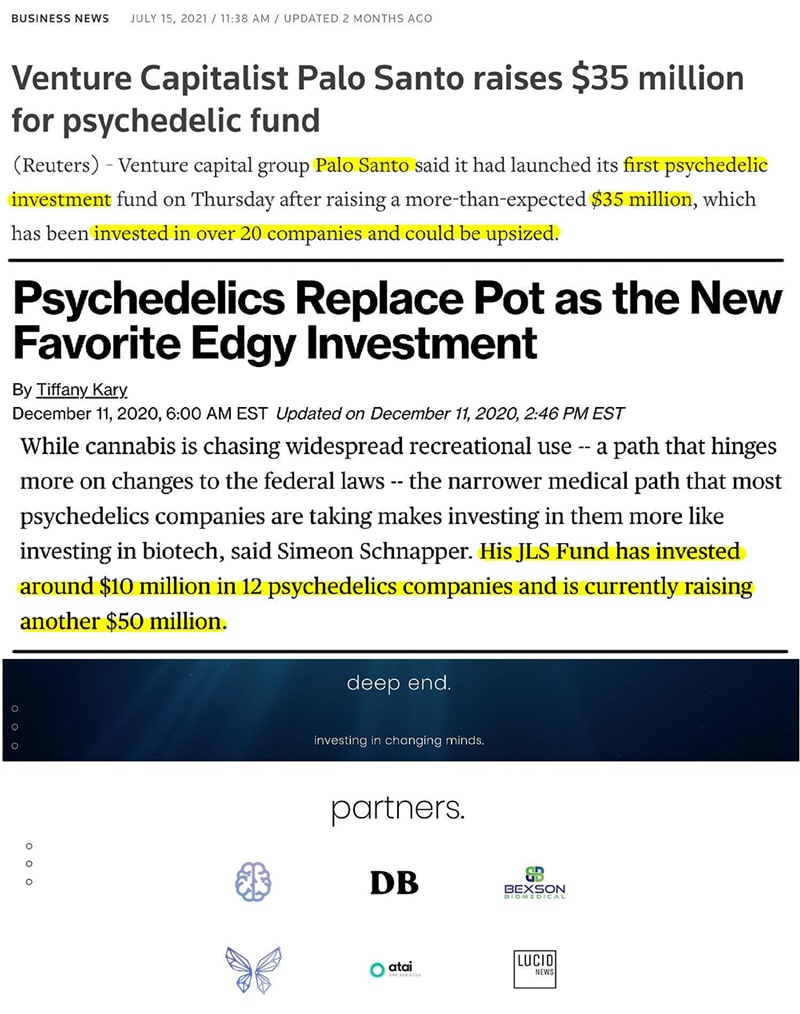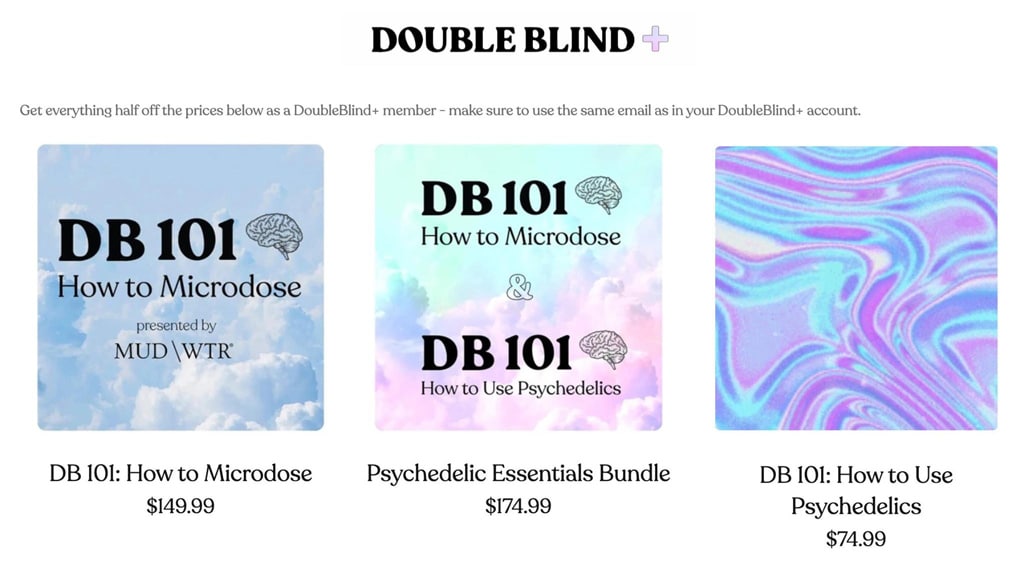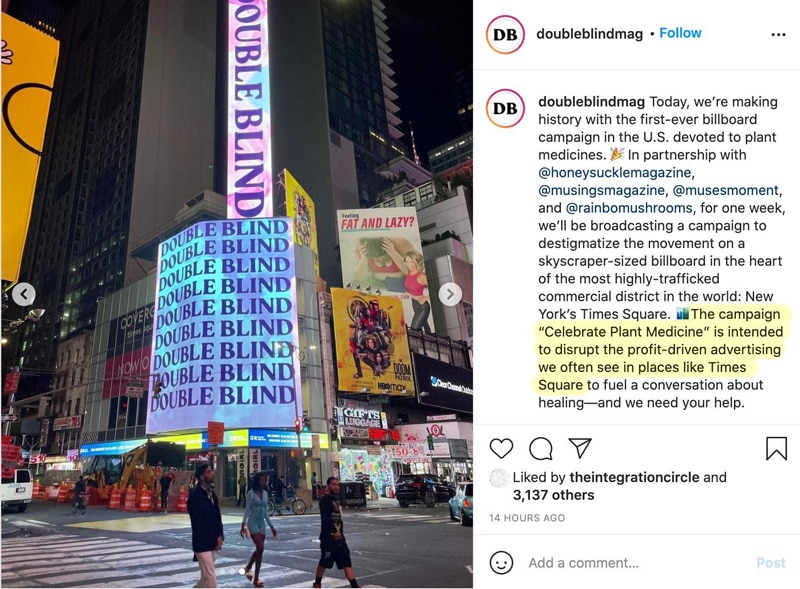DoubleBlind Claims Its Ad Was the ‘First-Ever’ U.S. Psychedelic Destigmatization Campaign — It Wasn’t
DoubleBlind claims its recently-unveiled New York City billboard is a lot of things, except what it actually is: a giant advertisement.

Psymposia is a 501(c)(3) nonprofit research and media organization that offers critical perspectives on drugs, politics, and culture. We rely on contributions from our readers and listeners. Your support is vital to sustaining Psymposia.
Support Psymposia’s independent journalism on Patreon and help us drive the Mystery Machine! We’re a bunch of meddling kids who are unmasking the latest shenanigans on the psychedelics beat.
At the beginning of 2020, I attended the Green Market Summit on the Economics of Psychedelic Investing in New York City. After leaving the summit — which featured some of the first public discussions of for-profit psychedelic investing — I took a walk through Times Square, where a massive LED billboard displayed an ad for the meditation app Calm.
Reflecting on this billboard in an article for Psymposia, I wrote that it seemed like the antithesis of where one might expect to find an ad for a meditation app. I wondered: “Will we see ads for MDMA-assisted psychotherapy in Times Square one day?”
Well, it appears that psychedelic lifestyle brands beat psychedelic pharma companies to the billboard space.
It’s official. We’re running the first-ever campaign in the U.S. devoted to destigmatizing plant medicines. If you’re in New York, it’s running from 9/26 at midnight to 10/3 at midnight at 719 7th Ave. Help us amplify the movement by seeing it! #celebrateplantmedicine pic.twitter.com/GKtWCPLZkN
— DoubleBlind (@doubleblindmag) September 29, 2021
DoubleBlind Magazine — a psychedelic-focused publication which shares venture capitalist investors with a number of psychedelic pharma companies like Atai Life Sciences, MindMed, and Field Trip — recently concluded what they call a “first-ever billboard campaign in the U.S. devoted to plant medicines” which aims to destigmatize plant medicine and “disrupt the profit-driven advertising we often see in places like Times Square to fuel a conversation about healing.”
“Why?” A DoubleBlind Instagram post reads. “Because we live in a world where we’re surrounded by advertisements trying to sell us things — from our phones and computers to our highways and even the skies. So, even if for one moment, we wanted to take up some of this space with a counter-message: one of the incredible healing potential of plant medicines.”

The billboard advertisement consisted of the message, “Are you ready to wake up? Witness the SCIENTIFIC Renaissance. Witness the CULTURAL Renaissance. Witness the MEDICINAL Renaissance.”
Following this message, brand names appeared descending down the billboard for mushroom supplement company, Rainbo; digital magazine and CBD “neck potion” retailer, Muses; DoubleBlind Magazine; and “Cannabis/Sexiness/Culture” magazine, Honeysuckle. The ad concluded with flashing images of each brand’s products, and the lines: “Dive Deep Into Plant Medicine. Join The Movement. #celebrateplantmedicine.”
#CelebratePlantMedicine w/ us now thru 10/3! We've got Times Square's 1st ever #psychedelics billboard at 719 7th Ave w/ @doubleblindmag @MusingsMagazine #RainboMushrooms.
Join us to grow the #plantbased #health movement. #NYC #TimesSquareBillboard pic.twitter.com/hUYfV6AFuI
— Honeysuckle Magazine (@HoneysuckleMag) September 28, 2021
Nowhere in these brands’ public statements about the billboard did they mention the word “advertisement.” Instead, they called this a “campaign” (notably without the modifier: “ad”) and encouraged their followers to “go visit the billboard: take photos, videos, and go live in front of the billboard using #celebrateplantmedicine. Follow and tag us and our partners so we can reshare your posts! If you feel called, we encourage you to include information in the caption of your posts about how plant medicines have transformed your life.”
In essence, this language asked DoubleBlind’s followers to take pictures of its advertisement and carry out viral marketing for the company.
According to DoubleBlind’s CEO, Shelby Hartman, DoubleBlind’s advertising partner, Honeysuckle, proposed this billboard campaign for September 20 (a day when people celebrate psilocybin mushrooms). But the ad campaign was not able to run until September 27 due to negotiations with the billboard owner.
Honeysuckle has pulled this stunt before on multiple occasions — buying billboard space and promoting it to followers as a conscious campaign to gain cultural cachet.
Earlier this year, the magazine managed to wrap three progressive-signaling topics into one “policy-changing” billboard advertisement campaign.
“As the United Nations issued its most dire report on climate change yet between National CBD Day and International Day of the World’s Indigenous Peoples, Honeysuckle Magazine, was at the heart honoring the First Nations, and female-led cannabis brands with the latest Times Square billboard campaign,” Honeysuckle’s press release read.
The campaign featured a number of billboards with Honeysuckle’s logo occasionally accompanied by lines like “Honors First Nations in Plant Medicine” or “Salutes Indigenous + Women + Organics” along with codes for 20% off CBD supplements. Honeysuckle has run a number of similar campaigns in New York City under the façade of bringing awareness to issues, while really promoting themselves and their ad partners.
In light of a daunting #ClimateReport, Honeysuckle held up #organicfarming and #natural medicine in NYC on #NationalCBDday, honoring those protecting the planet @frannysfarmacy @Legacy420store @corerootsforlife @maryjane_flowergirl
🎥 @samuelclemenslong pic.twitter.com/uAFPb0V7Ft— Honeysuckle Magazine (@HoneysuckleMag) August 11, 2021
Hartman told Psymposia that she believes their advertisement campaign differs from “profit-driven” advertisements because DoubleBlind and its advertising partners are all “impact-oriented businesses.”
Hartman said that all of DoubleBlind’s profits go directly to funding its journalism and “simply keeping the lights on,” but she can’t speak specifically for her advertising partners. It is unclear how DoubleBlind‘s approach differs from standard industry practices of media companies that advertise their products in the interest of generating profits.
“In regards to the billboard creative itself, it’s important to note that we only wanted the billboard to be about the destigmatization of psychedelics,” Hartman said. “But, crazily enough, we discovered that the companies who own the billboards required that our ad had a physical product in it and that it was clear who was behind it. To us, it was just an exemplification of the problematic system we’re a part of, and why advertising is so backwards in this country. We discussed it internally and decided that as long as we could still get messaging into the billboard about plant medicines and we could tie the campaign to a hashtag that would allow people to share their stories of transformation that it was still worth doing. So what you see as the final creative — which includes messaging [“Join The Movement”, “Dive Into Plant Medicine”] and a hashtag [“#celebrateplantmedicine”] — but also flashes through some of the things we sell (i.e. our magazines, the mushroom tincture) was the compromise.”
Psymposia noted that, in light of this compromise to drop educational messaging and replace it with product displays, it seemed incongruous to describe this advertisement as a “campaign to disrupt profit-driven advertising.”
“I’d like to acknowledge here that I understand and respect why you feel the words ‘campaign’ and ‘movement’ were misleading, given that there were physical products that are sold in the creative,” Hartman said. “Our opinion is that the context as to why we did that — simply because there was no other way to get the creative approved — and we still believed the billboard itself would drive people to our online journalism, which is all free, is important.”
Although she notes that the billboard may help these companies generate profits and drive people to DoubleBlind’s website (where it sells classes, magazines, and oil tinctures), Hartman does not think it is fair to categorize this advertisement campaign as “profit-driven.”

“To us, ‘profit-driven’ means that we are first and foremost motivated by profit, that our primary goal is to make money for money’s sake,” Hartman said. “That was not our incentive for running the billboard. Intention gets tricky when it comes to ethics — as there is no way for us to prove our intention to you — but we are not motivated by profit… Any profit we generate is in service of our work and our mission.”
This is true of any business. Hartman is essentially noting that DoubleBlind — a venture capital-backed media company — operates like a regular business.

As it ultimately appeared, the billboard campaign was a prime display of “conscious capitalist” advertising at work. “Conscious capitalism” is essentially when brands claim to represent an ethical, higher social purpose but continue to behave exactly like capitalist entities, hiding behind a corporate responsibility façade of “doing well by doing good.”
“Conscious capitalism’s role is to prop up the existing order by modifying its more minor attributes, while keeping its essential nature intact,” writer Alnoor Ladha wrote in a DoubleBlind article from 2020. “It is the desperate strategy of a dying system trying to keep our thinking within the narrow band of logic that makes it [the system] appear inevitable and necessary. This entirely false belief is what gives us the license to act as if we can continue human activity as we have been. In fact, it tells us that the world will be better for it. It is a strategy of business as usual, with the addition of a moral incentive.”
What are these billboard campaigns if not “business as usual, with the addition of a moral incentive”?
The only way this campaign differed from the “profit-driven advertising” it claimed to disrupt is because the brands said so. In reality, these brands spent money to get their names and products out in front of people, just like every other brand on a billboard in New York City. (For reference, the “Feeling Fat and Lazy” billboard behind the DoubleBlind billboard cost about $13,000 per month, or $3,250 per week).
One could argue that it would have been a much more radical move to have just donated the money they spent on the billboard campaign to the causes they claim to be representing. Instead, this ad campaign ends up appearing closer in line with Kendall Jenner’s Pepsi ad or Budweiser’s 2018 Super Bowl ads — which capitalized on protests for racial justice and disaster relief efforts, respectively, to sell their products.
In fact, grassroots campaigns to destigmatize plant medicine (some with strikingly similar names to #celebrateplantmedicine) have existed well before what DoubleBlind calls its “first-ever campaign in the U.S. devoted to destigmatizing plant medicine.” And they existed without the self promotion or expensive advertising fees.
In 2016, Psymposia and a coalition of psychedelic societies and nonprofit research groups ran an online psychedelic destigmatization campaign called #psychedelicsbecause.
More recently, Thank You Plant Medicine (TYPM) — a social media movement founded two years ago by David Grillot and Jonathan Glazer — asks people to publicly share healing experiences they’ve had with plant medicines. While there are criticisms of psychedelic exceptionalism to be made about this movement — such as not including plants like coca and poppy in their definition of “plant medicines” — one thing they do not appear to be doing is advertising supplements alongside their messaging.
Grillot told Psymposia that he was initially surprised to see DoubleBlind’s advertisement feature language so close to the language used by TYPM. But, ultimately, TYPM was supportive of DoubleBlind’s efforts.
Other billboards in the US have also featured psychedelics, such as the billboard for the band LSD’s self-titled album or any number of billboards for ketamine clinics. DoubleBlind’s own advertising partner, Honeysuckle, as well as medical cannabis guide creator, WeedMaps, have both run destigmatization billboard campaigns for cannabis — a plant medicine.
None of this is to say that DoubleBlind and Honeysuckle don’t produce valuable content. As noted above, DoubleBlind has published articles that serve as great critiques to its own recent advertising strategy. The magazine also claims to set aside a portion of its budget specifically for scholarships for its classes and the promotion and publication of BIPOC writers and journalists. And Honeysuckle has produced reporting which aided the compassionate release of California inmate DaReta Gail Steverson.
DoubleBlind claims to provide the “most trustworthy information on psychedelics,” and advertises that it has graduated over 5000 students. Given that DoubleBlind produces journalism and educational courses for novices on growing psilocybin mushrooms and microdosing with psychedelics, maintaining a relationship of authenticity and trust is essential. Any outlet that seeks to educate the public about growing and ingesting illegal drugs has a responsibility to uphold the highest standards of accuracy. It is misleading and a disservice to readers who trust the magazine not to call this billboard campaign what it is. It’s an advertisement, not a movement.
Hey! Before you go… Psymposia is a 501(c)(3) non-profit media organization that offers critical perspectives on drugs, politics, and culture. We strive to ask challenging questions, and we’re committed to independent reporting, critical analysis, and holding those who wield power accountable.
Our perspectives are informed by critical analysis of the systemic crises of capitalism that have directly contributed to the unmitigated growth of addiction, depression, suicide, and the unraveling of our social relations. The same economic elite and powerful corporate interests who have profited from causing these problems are now proposing “solutions”—solutions which both line their pockets and mask the necessity of structural change.
In order for us to keep unpacking these issues and informing our audience, we need your continuing support. You can sustain Psymposia by becoming a supporter for as little as $2 a month.
Russell Hausfeld
Russell Hausfeld is an investigative journalist and illustrator living in Cincinnati, Ohio. He has a Bachelor’s degree in Journalism and Religious Studies from the University of Cincinnati. His work with Psymposia has been cited in Vice, The Nation, Frontiers in Psychology, New York Magazine’s “Cover Story: Power Trip” podcast, the Daily Beast, the Outlaw Report, Harm Reduction Journal, and more.





